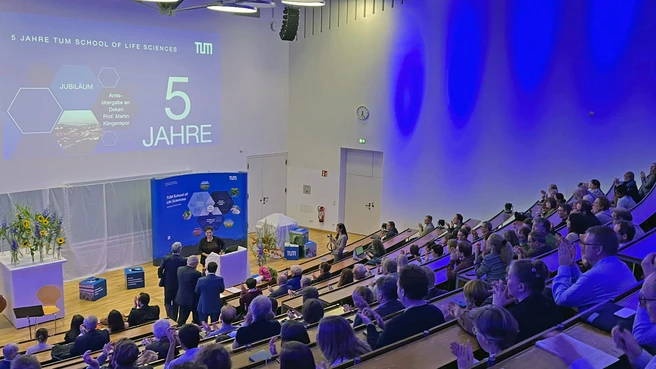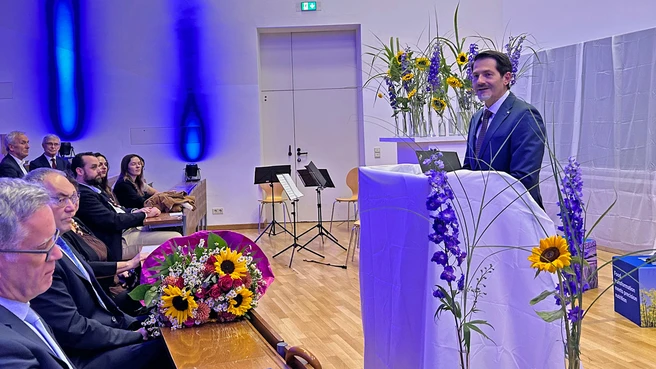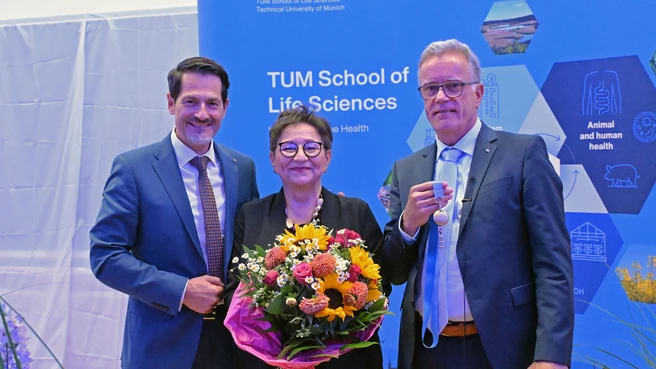Around 200 employees from a wide range of fields attended the School of Life Sciences' birthday celebration, with the Lumina string quartet providing the festive atmosphere. The dean opened the ceremony and warmly welcomed the guests, including the president and chancellor of TUM.
Message by TUM President Prof. Thomas F. Hofmann
In his speech, President Hofmann recalled that the TUM campus in Weihenstephan had already been through reforms when the School of Life Sciences was established as the first school at TUM as part of a comprehensive structural reform. Biology had already moved from Garching to Weihenstephan, and in 2000, forestry science, which had previously belonged to LMU, was taken over on campus.
Five years ago, the former Weihenstephan Science Center was finally transformed into the TUM School of Life Sciences. Although this structural change had been challenging, it had been rewarding because the school combined scientific excellence with entrepreneurial spirit: "One of the school's strengths is building bridges between disciplines. That is what we need in order to remain internationally competitive in the future." The president warmly thanked the dean for accepting this position four years ago, alongside her research, in order to make this transition happen.
Inspiration with start-up stories from Weihenstephan
The following impulse presentations showed how the TUM entrepreneurial spirit can give rise to actual start-ups. Two female founders presented their ideas and outlined the support they receive from TUM for their implementation – including from the TUM Venture Lab Food Agro Biotech, which is based on the Weihenstephan campus.
As a child in Brazil, food technologist Sarah Schlingloff witnessed how rainforests were being deforestated for livestock farming. That is why she is now developing plant-based meat alternatives in her start-up “Justake”: mushroom steaks with improved protein content, with expert support from Marius Henkel, Professor of Cellular Agriculture at the School.
Nathalie Stellwag recently founded Circular Grain, which offers a plant-based milk alternative made from brewer's grains that resembles oat drinks. Brewer grains are a by-product of beer production that has previously been used primarily as animal feed and in biogas plants. Stellwag receives supervision from Ute Weisz, Professor of Plant Proteins and Nutrition.
Science Slam – research presented with humor
Communicating research results in an understandable way – including for the general public – is an important concern for the School. Since 2024, the “Science Slam” has been held as a joint event format of the TUM School of Life Sciences and other scientific institutions in Weihenstephan. In his presentation entitled “In the Secret Service of Your Health,” bioinformatician Frederik Dröst provided insights into how a complex topic such as antibiotic resistance can be presented in an understandable and entertaining way.
What works against bacteria that survive treatment with antibiotics? According to Dröst, you need an agent that speaks the language of the resistant microbes: a trained bacteriophage injects its own DNA into the bacteria and disappears. The presentation played with James Bond images and showed bacteria and phages in comic style. In real life, bioinformatician Dröst actually trains bacteriophages in the lab and on the computer.
Dean's retrospective on the School's milestones
In her speech, Prof. Ingrid Kögel-Knabner focused on the successes of the School of Life Sciences. A generational change has taken place in the professorial staff: Since the school was founded five years ago, 46% of professorships have been newly filled, half of them with women, and the international proportion of New Appointees has also risen.
The dean also mentioned the successes in externally funded projects, including EU projects led by the school, as well as the “Highly Cited Researchers.” These researchers represent a wide variety of disciplines, which contributes to the School's success in the rankings of degree programs.
Instead of the former academic faculties, new, joint structures have been established at the School. These include the Campus Office and other specialized teams, such as for marketing and communication. Prof. Ingrid Kögel-Knabner also emphasized that networking among colleagues is important, for example at secretary meetings.
In 2025, the School reached a special milestone – it hosted its first central graduation ceremony. Dean Kögel-Knabner thanked everyone for helping to shape these changes.
Handover of office in the deanery to Prof. Martin Klingenspor
At the end of her speech, she handed over the deanery to her successor, Prof. Martin Klingenspor, symbolically giving him a gold-colored transponder for access to the deanery building, much to the amusement of the recipient and the audience.
Prof. Martin Klingenspor praised his predecessor's services to the School, her strategic vision, and her achievements in international research as a highly decorated scientist: Prof. Ingrid Kögel-Knabner has been one of the “Highly Cited Researchers” for ten years in a row and thus has an impact in her field of soil science far beyond Weihenstephan. She has also been awarded the Order of Merit of the Federal Republic of Germany and the German Environmental Award.
Her successor as dean is now looking forward to his new task of “working with everyone to foster the School in the spirit of excellent and responsible science.”


